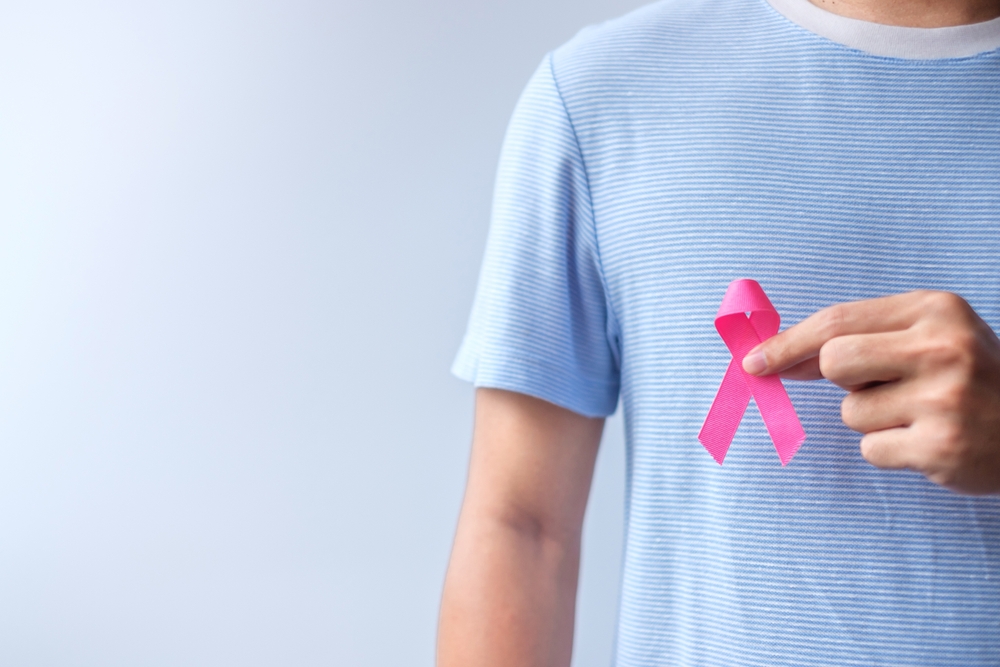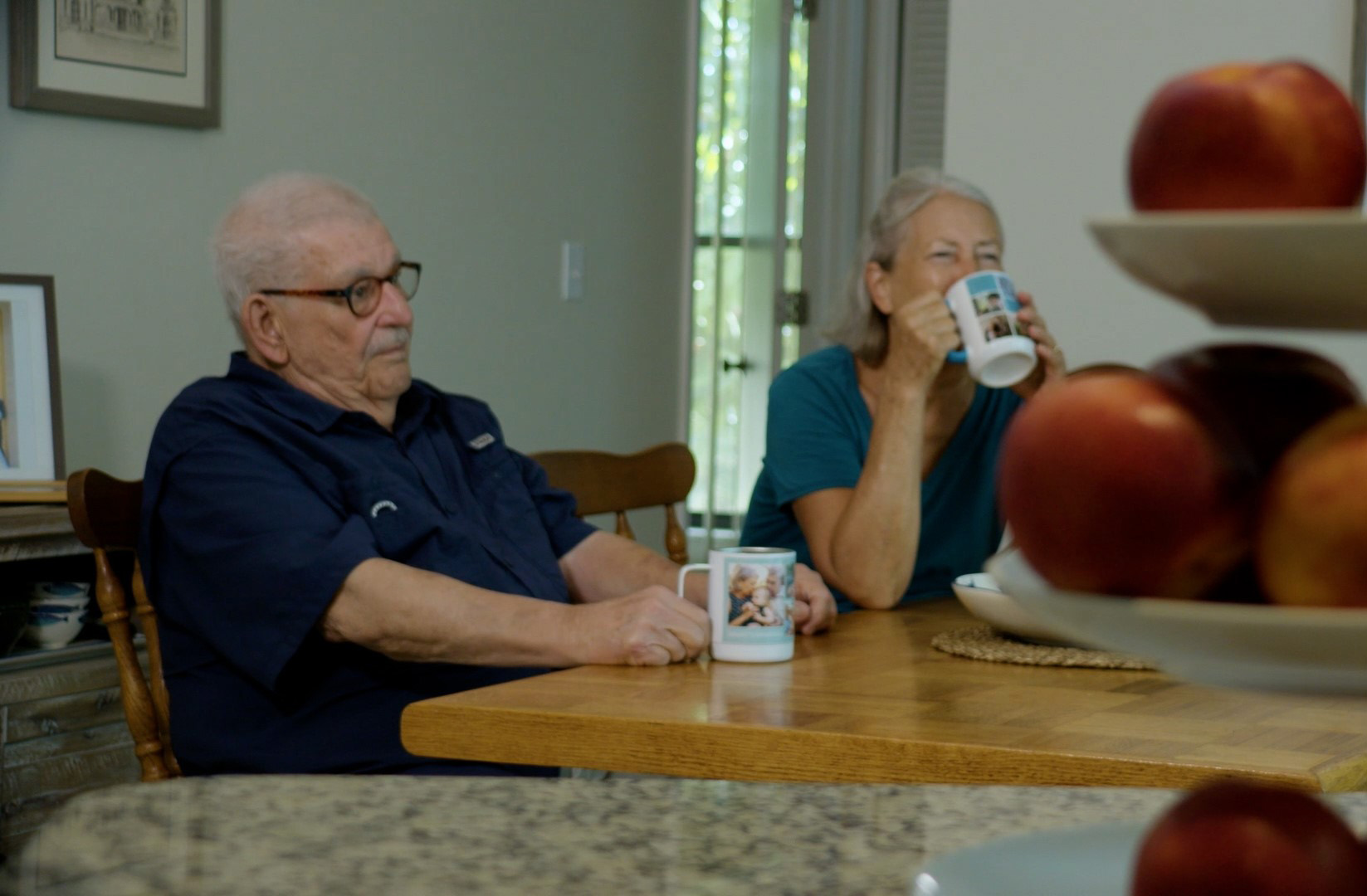Breaking the Silence: A Male Breast Cancer Survivor's Journey
Cancer CarePosted:

This October marks Breast Cancer Awareness Month, which highlights breast cancer research, prevention, and treatment. Each year, about 270,000 women in the United States get breast cancer, and 42,000 women die from the disease, according to the Centers for Disease Control and Prevention (CDC).
And while pink ribbons and awareness campaigns understandably focus on women, the annual observation also reminds us that the disease affects everyone – regardless of gender.
In January, Robert Arnholt, 79, stepped into the shower one evening, forgetting his washcloth. His oversight would lead to a life-changing discovery: while using bar soap instead of his usual washcloth, he found something unusual – a lump in his breast that "wasn't supposed to be there,” as he says.
An unexpected diagnosis
Like many men, Robert probably never imagined he would face breast cancer. While breast cancer is the most common cancer diagnosed in American women, it's rare in men.
According to the American Cancer Society, about 2,800 new cases of invasive breast cancer are diagnosed in men annually in the United States, and approximately 530 men die from the disease each year. Male breast cancer accounts for less than 1 percent of all diagnosed breast cancer cases.
Fortunately, Robert's quick action led to early detection. Within days, the Cape Coral resident visited a neighborhood Lee Health Convenient Care, where board-certified family medicine practitioner Dr. Arno Loeffler insisted Robert see his primary care physician, board-certified internist Dr. Paul Oswiecimski, immediately and "don't take no for an answer,” as Robert recalls.
When Dr. Oswiecimski (whom Robert affectionately calls “Dr. O”) ordered a mammogram for Robert, he told the doctor: “That can only mean one thing. And Dr. O said, yes, I think you might have breast cancer.”
A second mammogram biopsy confirmed the diagnosis: Robert was diagnosed with stage 1 cancer of the left breast.
"At that point, my mind went into overdrive," Robert says. "Who do I call now? What do I do?"

In a single visit, Robert and his wife Carol met with his entire team of cancer experts at Lee Health Cancer Institute's Multidisciplinary Breast Clinic
Warning signs of male breast cancer
As Robert notes, the lump in his left breast "never was something that hurt or was prominent unless I was bathing." According to the CDC, breast cancer symptoms can be subtle but should never be ignored.
Men should be aware of these common symptoms:
- A lump or swelling in the breast
- Redness or flaky skin in the breast
- Irritation or dimpling of breast skin
- Nipple discharge
- Pulling in of the nipple or pain in the nipple area
Risk factors
Several factors can increase the chances of a man getting breast cancer, including:
- Age (most common in men over 60). The risk increases with age.
- Family history of breast cancer
- Inherited gene mutations (BRCA1 or BRCA2)
- Overweight and obesity
- Liver disease
- Radiation exposure to the chest
- Hormone therapy treatment
- Klinefelter's syndrome. Klinefelter syndrome, a rare genetic condition in which a male has an extra X chromosome, can lead to the body making higher levels of estrogen and lower levels of androgens. These hormones help develop and maintain male sex characteristics.
Source: CDC
Comprehensive cancer care makes all the difference
Born and raised in Coral Gables in South Florida, Robert’s varied life experiences include serving as a sailor in the U.S. Navy, flying the skies as a regional airline pilot, marrying the former Carol Kulacz 46 years ago, and working as an insurance agent in Michigan, where he and Carol raised a son and a daughter.
In 2017, the couple left the Wolverine State to enjoy their retirement years in the familiar environs of Robert’s home state, Cape Coral.
But none of his experiences could have prepared Robert for the shock of his unexpected diagnosis eleven months ago.
“I thought at the time, ‘how do I get the right people to treat this?’ Because the way I’m wired is, you give me a situation I have to deal with, and my mind goes ‘click-click-click-click’ through all the things I need to do,” he says. “I thought at the time, holy moly, that’s a lot of stuff.”
Robert says what could have been an overwhelming journey was made manageable through the coordinated care at Lee Health Cancer Institute's Multidisciplinary Breast Clinic, Southwest Florida’s only accredited Cancer Center. It holds nationally recognized accreditations from the Commission on Cancer (CoC), National Accreditation Program for Breast Centers (NAPBC), National Pancreas Foundation, and GO2 Foundation for Lung Cancer.
In a single visit to the Institute, Robert and Carol met with a team of cancer experts to discuss his proposed treatment plan.
“My wife and I sat there and listened to a whole bunch of specialists, including a medical oncologist, general surgeon, radiation oncologist, nutritionists, nurse navigators, and support staff. These were high-level doctors and cancer specialists, and they all took turns talking about their suggested care and treatment plans for me. They included me in their decision-making, so not only did I feel empowered, but most importantly, not alone.
“It was like a weight off my shoulder. I really didn’t worry about it after that. Everything kind of went on autopilot for me. My healthcare cancer team arranged for everything.”
WATCH HEALTH MATTERS: Lee Health Cancer Institute Nurse Navigators are there for you
Robert adds, “Getting cancer ruined my 2024, but it was sure made easier by Lee Health and the way they handled things.”
Robert’s treatment journey
Robert's treatment plan included surgery in February, and then both chemotherapy and radiation therapy.
He also continues to receive ongoing support from his specialists on his cancer team. His ongoing visits include:
- Regular consultations with a nutritionist
- Physical therapy for lymphedema management
- Exercise guidance
- Medication that will continue for approximately five years
"You get the feeling that they are there for you," Robert reflects. "I've had that feeling ever since. I've been so grateful for that.”
Understanding mastectomy
While treating breast cancer often involves various approaches, Robert’s case involved surgery, a typically crucial component of breast cancer treatment. A mastectomy – the surgical removal of breast tissue – is a common procedure for both male and female breast cancer patients. Robert's surgery also included removal of a sentinal lymph node.
According to recent studies, about 90 percent of men diagnosed with breast cancer undergo mastectomy, compared to about 35 percent of women.
This higher rate is partly because male breast cancer is often diagnosed at later stages and because breast-conserving surgery is less commonly performed in men due to the smaller amount of breast tissue.
In February, Robert, in the exceptional hands of board-certified general surgeon Dr. Thomas Kowalsky, underwent a mastectomy at HealthPark Medical Center. For men like Robert, the procedure is often more straightforward than for women due to less breast tissue, but the emotional and physical impact can be equally significant.
“I can appreciate more what women diagnosed with breast cancer have to endure when facing this disease,” Robert says. “It’s really opened my eyes regarding the changes cancer can have on a person’s appearance and issues with self-image.”
Breaking the stigma
While Robert acknowledges that being a male cancer survivor is "one group I would prefer not to be a member of," his story highlights the importance of awareness about male breast cancer.
Unlike other male cancers that have routine screening procedures like PSA tests for prostate cancer or colonoscopies for colorectal cancer, breast cancer in men often goes undetected until physical symptoms appear.
Key takeaways for men
- Perform regular self-exams, especially during bathing
- Know the warning signs and risk factors
- Don't delay seeking medical attention if you notice changes
- Remember that early detection significantly improves treatment outcomes
- Advocate for your health - as Robert's doctor advised, "don't take no for an answer"
Robert has completed his chemotherapy and radiation treatments. He’s now on medication and currently follows up with his cancer team every few months to make sure he continues his recovery.
He offers some hard-earned wisdom for men who may be diagnosed with breast cancer.
“Ask questions, lots of questions, until you feel comfortable with the answers,” he says. “And don't take ‘no’ for an answer or accept a delay for a test or an appointment. Saying ‘no’ can save your life.”
Robert’s cancer survivor journey reminds us that while male breast cancer is rare, it's real. He hopes sharing his story demonstrates how comprehensive cancer care can make a challenging journey more manageable. Through sharing experiences like his, he hopes to help break the stigma surrounding male breast cancer and potentially save lives through increased awareness.
WATCH HEALTH MATTERS: In Robert’s Own Words
Stories like Robert's help remind us that behind every statistic is a real person and that awareness truly can save lives.
The Lee Health Cancer Institute helps cancer patients with comprehensive care and treatment plans from its expert team of medical oncologists, specialists, and nurse navigators.
Resources are accessible and conveniently located for residents in Cape Coral, Naples, Fort Myers, Port Charlotte, Estero, and Bonita Springs. The Institute also offers in-person or telemedicine healthcare services.
For a consultation or to make an appointment with one of our cancer specialists, call 239-343-9500.

